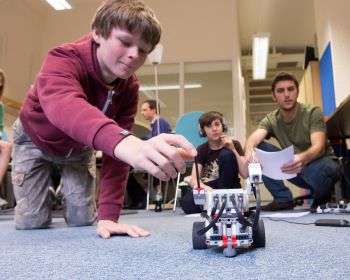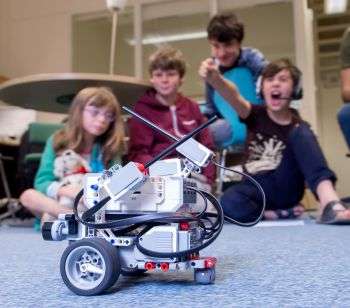Researcher finds children have better manners than robots

A group of children proved that they had better manners than a robot as they tried to program it to move, stop, and react to touch as part of a research project at the University of Sussex.
The four children were learning how to program a small Lego robot using spoken commands, but communication broke down after it didn't understand the word 'please'.
Eventually the junior scientists were able to get through to the robot, successfully ordering it to move left and right and spin on the spot.
The experiment was organised by Stefanos Karapatakis, an undergraduate student at the University of Sussex who is spending his summer researching new ways of teaching children about computers.
Amber Kennedy, eight, who was one of the four children taking part, said: "I like the robot, it's very good. It goes really fast and spins around."
Gabriel Kennedy, 14, added: "Programming the robot was fun, although it was a little slow to react. I like robotics and technology, and I'd like to be a scientist when I get older."
Stefanos, a third-year Computer Science student in the University's Department of Informatics, explained: "By using simple voice commands, younger children can develop an understanding of computers before they are able to use text-based systems.
"Becoming creators rather than simply consumers of computing technology will be very beneficial to children, both in terms of their future careers, but also in supporting their creativity."
Stefanos's project is being supervised by Dr Kate Howland, Lecturer in Interaction Design in the Department of Informatics. Dr Howland said: "This project fits in with a broader programme of research in the department around developing young people's understanding of computation.
"Our previous research has shown that using natural language (or 'plain English') in novice programming tools can help children to learn the language of computation. Stefanos's project has laid the groundwork for exploring a new way to use natural language in computer science education."
The children, whose parents are staff at the University, weren't communicating directly with the Lego EV3 robot but were instead speaking through a microphone to a PC, which translated their instructions into computer code and relayed them to the robot. A short video of the programming session can be viewed below.
Stefanos explained that the robot's politeness malfunction was actually a helpful finding. "I was recording some cases when the system crashed as a result of behaviours the children expressed. For example, one of the children was saying some commands followed by 'please' which was causing the robot not to respond.
"This shows us that we could improve the system by including support for both the commands 'stop' and 'stop please'."

Stefanos is one of more than 40 undergraduates who are getting a taste of research this summer through the University's Junior Research Associate (JRA) scheme.
The scheme provides talented and ambitious undergraduates with a £2,000 bursary, allowing them to participate in original research with academic staff and other members of the University community during their summer vacation.
This year's undergraduates are conducting research into areas as diverse as renaissance cookbooks, online dating, Alzheimers' disease and Second World War history.
The students' projects are due to finish in September, after which they will present their findings at an exhibition on the Sussex campus.
The student with the best project will get to showcase their research at the Houses of Parliament as part of the British Council for Undergraduate Research's 'Posters in Parliament' event, which celebrates the best of undergraduate research.
More information: "Learning to communicate computationally with Flip: A bi-modal programming language for game creation," Computers & Education, Volume 80, January 2015, Pages 224-240, ISSN 0360-1315, dx.doi.org/10.1016/j.compedu.2014.08.014
Provided by University of Sussex




















